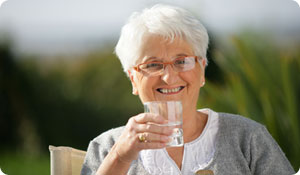
There is a strong link between diet and bladder control. Specific foods and drinks, portion sizes, and the time of day a person eats and drinks can all have an impact on symptoms like uncontrollable urges or bladder leakage. If you have any symptoms of incontinence, itís highly recommended you see a doctor and discuss treatment options, but there are several changes you can make to everyday habits that may help you manage symptoms.
Here are six common habits that could impact bladder control, along with easy solutions that may improve your symptoms:
1. Drinking too much liquid.
Staying hydrated is a basic component of health, but too much of a good thing can spell trouble for bladder control. When someone drinks too much, the excess liquid overfills the bladder, which can aggravate or cause an episode of incontinence. Conversely, when you have too little to drink, urine will be more concentrated, which can irritate a sensitive bladder and worsen the urge to relieve oneself.
The Solution: Pay attention to how much you're drinking over the course of the day. Your daily goal should be to drink about eight eight-ounce glasses of water, which should be enough to keep you hydrated without overdoing it.
2. Having a beverage before bed.
It's not just what you eat and drink, but when you eat and drink. A glass of milk or tea before bed can help you unwind, but it can also make it difficult or impossible to hold in your urine until you wake in the morning.
The Solution: Forego beverages for several hours before you go to sleep. If you need something to help you unwind at bedtime, try yoga, reading, or listening to soothing music.
3. Enjoying a few beers with friends.
A few alcoholic beverages won't harm most people, but for someone who experiences urinary incontinence, alcohol can trigger leakage. This is because alcohol can leave you dehydrated, which in turn irritates the bladder. Alcohol can also interfere with communication from the brain to the bladder about when to go, making a person more susceptible to having an accident.
The Solution: Limit alcohol intake. Some people find that they can manage one drink at a time, while others need to forego alcohol altogether in order to prevent incontinence. Experiment to see what works best for you.
4. Caffeinated foods and drinks.
That tasty chocolate bar may not be much of a treat. The caffeine it contains stimulates the bladder and also serves as a diuretic. Caffeine-containing drinks like coffee and tea can cause the same type of reaction.
The Solution: Cut back on chocolate and caffeinated drinks to see if this minimizes the problem. Decaf options are better choices but they can still pose bladder challenges, particularly if you go for carbonated sodas, since they can be irritating as well.
5. Spicy meals.
You may love exotic flavorings, but beware what they can do to your bladder control. Heavily seasoned foods can irritate bladder lining. The same is true of foods and drinks that have a high acid content, including citrus juices, tomatoes, and some fruits.
The Solution: Pay attention to what you eat and how it impacts your bladder control. A food journal may help you spot links between diet and symptoms, helping you identify what you can tolerate and what you may need to eliminate.
6. Potential side effects of medications.
Blood pressure medicine, sleeping pills, antidepressants, and muscle relaxers can all cause or aggravate incontinence. Some drugs relax the muscles and cause urinary leakage, while others increase the amount of urine output, or hinder your ability to recognize that your bladder is full. All of these can be troublesome.
The Solution: Read the fine print for the possible side effects of the medications you take, or ask your pharmacist if any of your treatments could be making incontinence worse. If so, talk to your doctor. You may be able to try an alternative drug, adjust the dose to minimize the problem, or come up with some other approaches that can help you to gain better bladder control.
Sources:
Koch, Kristin. CNN: Health.Com. "10 Things That Can Make Incontinence Worse." 21 March 2011. Web. 25 June 2012.
http://www.cnn.com/2011/HEALTH/03/21/worse.incontinence.health/index.html
Mayo Clinic. "Urinary Incontinence Causes." 25 June 2011. Web. 29 June 2012.
http://www.mayoclinic.com/health/urinary-incontinence/ds00404/dsection=causes





